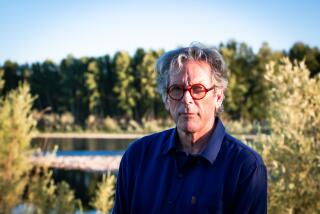The Siren’s Call: Where’s Rimbaud?
- Share via
In the worlds of myth and literature, plenty of figures have had their “lost” years. There are, to name a few, Sherlock Holmes (after the plunge from Reichenbach Falls), the wizard Merlin (was he imprisoned in a cave or was he killed?), Shakespeare (what was his education and upbringing?) and Jesus (did he or didn’t he go to India as a child?).
What did they do during those years? How did they live? Such questions have lured many writers into producing books that try to fill in these tantalizing gaps with definitive evidence.
Jamie James resists the impulse to be conclusive in examining a gap in the real life of 19th century French poet Arthur Rimbaud in his book “Rimbaud in Java: The Lost Voyage” (EDM: 128 pp., $14.95 paper).
Rimbaud hardly had time to break into a sweat in his new Dutch Colonial Army uniform (he had signed on as a mercenary) before, late in summer 1876, he disappeared into the jungle in Java. There are no records for his activity until six months later, when he appeared again in Paris. Where did he go? Did he stay in Java? What did he see?
James organizes his book according to two categories — the facts of Rimbaud’s time in Java, and James’ careful speculation of what the poet might have experienced, which he sets in the context of other literary figures (Baudelaire and Flaubert among them). A past contributor to the Times’ book pages and the author of several books, including “The Snake Charmer” and “The Music of the Spheres,” James has lived in Bali and Jakarta for more than 13 years — you couldn’t find someone else in a better position to research and formulate answers. James talked about his book with The Siren’s Call via a recent email exchange.
Siren’s Call: You say that during the early days of his disappearance, Rimbaud was a fugitive. What do we know about his life at this period, and why do you think scholars haven’t examined it very closely? Authors are always looking for fresh new angles — I’m surprised that someone didn’t pounce on this mystery years ago.
Jamie James: It hasn’t exactly been avoided. Rimbaud’s first biographer, his brother-in-law, speculated hilariously that he hid in the jungle, where he was protected by kindly orangutans, who taught him how to survive the attacks of tigers and boa constrictors — never mind that the orangutan had been extinct in Java for 200 years, and the boa constrictor is a New World species.
In the early 20th century, when Rimbaud’s reputation as the enfant terrible of modern literature emerged, scholars devoted endless ingenuity to attempts to establish his exact itinerary in Java, grasping at the wispiest of straws. Modern academics have dealt with the episode rather briskly, partly because the documentary evidence is so thin, and partly, I think, because even well-educated Westerners know so little about this part of the world, much less what life was like here in the 19th century.
SC: The fact that you’ve lived in Bali for many years gives you an advantage over the scholar going there for the first time to search for Rimbaud. You understand the culture on a more intimate level and that probably helps in speculating about what was realistically possible for Rimbaud. Did you feel that you had an edge over other scholars in tackling this mystery?
JJ: Of course! Unless you know a place, it’s impossible to write even the barest facts without succumbing to cliché and cultural prejudice. After I moved to Bali, my elderly aunt in Texas asked me if I lived in a regular house — she thought that if I was in Indonesia, I must be living in a grass shack, like a Dorothy Lamour movie. That doesn’t mean that I can say with any degree of confidence what Rimbaud might have done when he was here, but I do have a reasonably secure knowledge of what he would have seen and some sense of how he might have been received. One of the great mysteries of Rimbaud’s Java adventure was how he ever could have gone underground. A blue-eyed, fair-haired 21-year-old Frenchman would have been an object of wonderment everywhere he went in Java.
SC: You started this book as a novel. Why did it change? Why did imagining this time in Rimbaud’s life seem better suited for nonfiction speculation than as fiction?
JJ: One thing I learned from writing this book was that I really don’t approve of novels that reanimate famous people of the past, particularly writers and artists.
There are great exceptions, of course; Marguerite Yourcenar’s “Memoirs of Hadrian” is a modern masterpiece because she really inhabits the emperor’s mind. But most historical fiction about artists sinks to the titillating sentimentality of “The Agony and the Ecstasy,” with Michelangelo as a blustering Ayn Rand hero. It’s particularly difficult in the case of Rimbaud, because his main quality was his utter unpredictability. He was always surprising his best friends, people who had known him all their lives. The Java adventure amazed them — they wrote letters back and forth among themselves speculating about what he had done and why. What finally stymied me was writing dialogue for him. It seemed like such an act of hubris to put words in the mouth of Arthur Rimbaud. It was like writing dialogue for Bob Dylan: I kept feeling I was in danger of being tragically unhip.
SC: Java, as you describe it in your book, was an extraordinary place for the traveler. Rimbaud would have seen a landscape dotted with old Hindu temples and magic practices even though, you write, it was “a predominantly Muslim land.” Why would such an amazing experience have never seeped into his writing somehow … or did it? Did you find any clues in the poetry that suggest his Java experience?
JJ: Actually, you touch upon the greatest Rimbaud mystery of all. Somewhere right around the time of his Java adventure, most likely before it, Rimbaud stopped writing poetry. He was just 21. But what does it mean, to stop writing? Does a writer in a dry spell stop being a writer, even if the drought lasts the rest of his life? All we know is that he never again gave a poem to anyone to read, not that we know about. He might have written hundreds of pages of poetry that he burned. It is entirely possible that the lost journals of his voyage to the tropics may turn up someday in a moldering old trunk in a country house in Java. But the basic law of literary scholarship is: You have to go with what you’ve got.
SC: You say he’s “one of those writers who can change the reader’s life.” Was that true for you? Did your understanding of him deepen as a result of writing this book?
JJ: Nothing improves reading the way writing does. If you have to formulate an opinion about a book and express it persuasively, you understand it far better. In Rimbaud’s case, the pleasure of reading comes directly from the progress, sometimes the struggle, toward understanding the piece. A Rimbaud poem is a mystery that never gets resolved, a whodunit with the last chapter ripped out. You never really get there. In this sense Rimbaud was the first modernist: his poems are about the puzzling, dazzling journey, not the destination.
Owchar is Times deputy book editor. The Siren’s Call appears monthly at https://www.latimes.com/books.
More to Read
The biggest entertainment stories
Get our big stories about Hollywood, film, television, music, arts, culture and more right in your inbox as soon as they publish.
You may occasionally receive promotional content from the Los Angeles Times.










